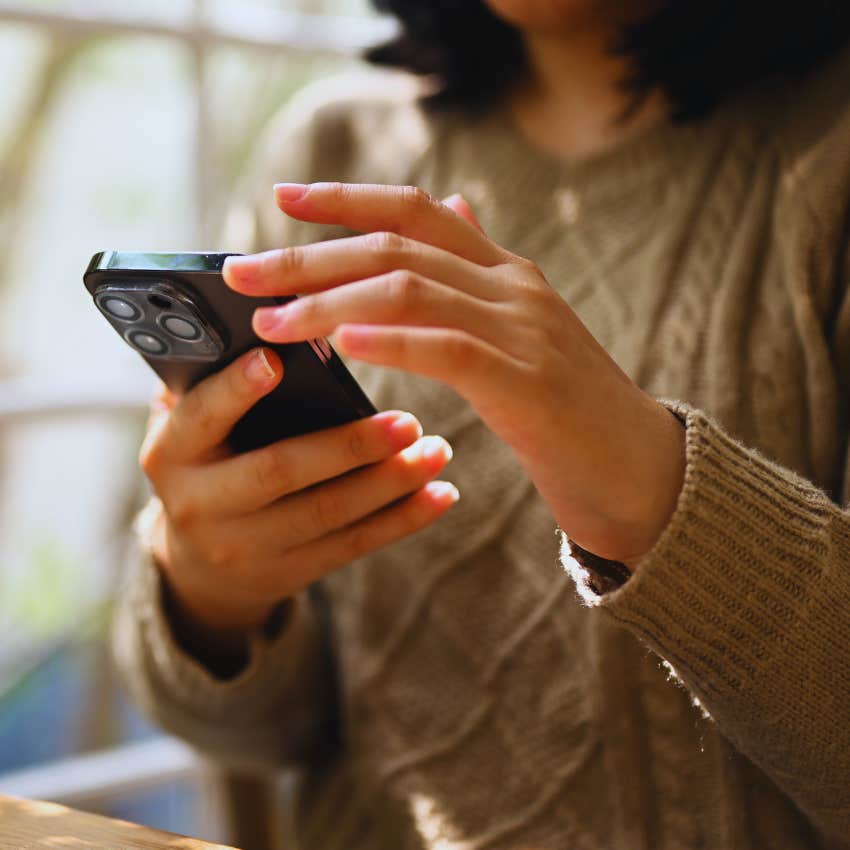The Type Of Person Most Likely To Hurt Other People (Without Meaning To)
You might not even realize you're doing this.
 Prostock-studio via Canva
Prostock-studio via Canva If someone you love struggles with intimacy and relationships due to having an avoidant attachment style, they may not realize that the reason dating is so hard is because they're pushing people away with their behavior.
They probably don't even realize they're keeping people who want to get to know them at an arm's length.
There are many ways of doing this, but when it comes to dating, if you find your partner scrolling on their phone instead of engaging with you, they might not realize they're engaging in "phubbing."
"Phubbing," is snubbing someone in favor of scrolling Instagram or the latest news on your phone. It's “safe” in the eyes of the avoidant-attached person and may not appear to them as rude behavior.
Obsessively scrolling or checking their cell phone during date nights or family interactions is a way for the avoidantly attached individual to keep intimacy and connection at arm’s length — to foster their independence and avoid engagement.
Phubbing is another way to avoid sharing too much of yourself, and therefore, eliminates the risk for avoidants of being rejected, not having their needs met, or feeling hurt through connection with others.
What is avoidant attachment injury?
"Avoidant" is one style of attachment. Each of us possesses characteristics of all four attachment styles: Secure, avoidant, anxious/ambivalent, and disorganized.
In avoidant attachment, the child was left largely to their own devices to have their needs met, resulting in over-independence and an “I can do this better myself,” attitude.
Attachment injury is a method of survival — not a flaw. Attachment adaptations are a neurological response to the need to survive. Avoidantly attached individuals have many admirable qualities: Stability, reliability, and effective problem-solving.
In childhood, avoidants had to learn how to meet their own needs because no one else was consistently satisfying them. This might have come from a parent who was also avoidant, had a sickness that prevented early bonding, engaged in substance abuse, suffered from extreme grief, worked long hours, or was emotionally unavailable.
In adult relationships, avoidance can express itself in a variety of ways:
- Fear of intimacy
- Chronic romantic partners
- Difficulty with commitment
- Inability to ask for help or support
- Lack of trust or suspicion of others
- Inability to express feelings using language
- Discomfort and leaving when the relationship gets “real”
- Needing more alone time than together time
Smartphones make it even more accessible for avoidant individuals to withdraw deeper into their shells of isolation while still satisfying the innate human need to connect with others.
You can think of it as a protective barrier between the avoidantly attached person and the messy reality of human-to-human connection. You may find avoidants at a dinner party scrolling their phones rather than engaging with those around them.

Digital connections are safer because they lack realness.
Phone use might actually satisfy something deep within the avoidantly attached person. Everyone, no matter their attachment style, craves human connection, understanding, acceptance, and intimacy.
Digital connections can make you feel a false sense of intimacy because your online personas are based on fantasy. It’s a false sense of satisfaction without the messiness of three-dimensional human relationships.
It’s easy to feel a connection through texting, social media interactions, and even digital affairs, and far less threatening than actual relationships. In-person time (rather than online fiction) would reveal these relationships for what they really are — flawed and threatening.
Phones are not the only threat to connection.
Sports, laptops, pornography, movies, television, hobbies, gaming, and any other distracting activity in excess draw attention away from the people in your life and also build a wall of safety to prevent genuine intimacy.
People with avoidant attachment can also come off as overly critical because it’s another way to push their partner away and gain space.
While being ignored can feel deeply offensive, rude, and even make you feel like you don’t matter, recognizing that these behaviors come from a fearful place deeply rooted in early development can help you bring compassion to your reaction.
While it might not be a personal affront toward you, it's also beneficial to let your partner know how you feel in non-threatening terms. It might help to use “I” statements instead of “you” statements.
- "I would appreciate more quality time with you."
- "I feel like we spend too much time on our phones."
- "I love when we go for walks together."
- "I often feel like I’m in competition with your phone."
- "I am wondering if you’d share what you’re reading with me."
- "I am interested in your day."
- "I love spending time together."
- "I crave connection and closeness."
Creating digital-free zones can also deepen intimacy.
Phone-free meals, no phones in bed, and digital downtime can help show an avoidant partner that closeness and intimacy are both safe and enjoyable.
Rather than complaining when your phubbing partner checks out, verbalize your appreciation for the quality time you spend together.
When working through challenges with avoidant partners, keep in mind that they can only process connection (and conflict) in small doses or they will retreat further, become exhausted, or shut down. Allow time for them to reenergize with solitude.
Conflicting attachment styles can help one another grow through appropriate languaging and learning to love in a way that feels less threatening and more rewarding to both.
Diane Poole Heller, Ph.D. is a psychotherapist who helps individuals and couples understand and decode the attitudes and behaviors that were instilled in them from childhood so they can enjoy enduring love, intimacy, and happiness. She is the author of "The Power of Attachment: How to Create Deep and Lasting Intimate Relationships."

